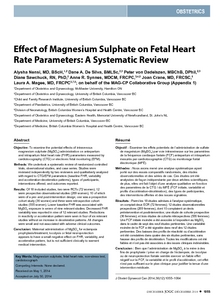Nensi, A; De Silva, DA; von Dadelszen, P; Sawchuck, D; Synnes, AR; Crane, J; Magee, LA
(2014)
Effect of magnesium sulphate on fetal heart rate parameters: a systematic review.
Journal of Obstetrics and Gynaecology Canada, 36 (12).
pp. 1055-1064.
ISSN 1701-2163
https://doi.org/10.1016/S1701-2163(15)30382-0
SGUL Authors: von Dadelszen, Peter
![[img]](https://openaccess.sgul.ac.uk/107514/1.hassmallThumbnailVersion/nensi%20-%20jogc%20-%20MgSO4%20%26%20FHR%20-%202014.pdf)  Preview |
|
PDF
Published Version
Available under License ["licenses_description_publisher" not defined].
Download (919kB)
| Preview
|
Abstract
OBJECTIVE: To examine the potential effects of intravenous magnesium sulphate (MgSO4) administration on antepartum and intrapartum fetal heart rate (FHR) parameters measured by cardiotocography (CTG) or electronic fetal monitoring (EFM). METHODS: We undertook a systematic review of randomized controlled trials, observational studies, and case series. Studies were reviewed independently by two reviewers and qualitatively analyzed with regard to CTG/EFM parameters (baseline FHR, variability and acceleration-deceleration patterns), types of participants, interventions offered, and outcomes reported. RESULTS: Of 18 included studies, two were RCTs (72 women); 12 were prospective observational studies (269 women), 10 of which were of a pre- and post-intervention design; one was a prospective cohort study (36 women) and three were retrospective cohort studies (555 women). Lower baseline FHR was associated with MgSO4 exposure in seven of nine relevant studies. Decreased FHR variability was reported in nine of 12 relevant studies. Reductions in reactivity or acceleration pattern were seen in four of six relevant studies without an increase in decelerative patterns. All changes were small and not associated with adverse clinical outcomes. CONCLUSION: Maternal administration of MgSO4 for eclampsia prophylaxis/treatment, tocolysis or fetal neuroprotection appears to have a small negative effect on FHR, variability, and accelerative pattern, but is not sufficient clinically to warrant medical intervention.
| Item Type: |
Article
|
| Additional Information: |
© 2014 Society of Obstetricians and Gynaecologists of Canada. Published by Elsevier Inc. All rights reserved. Made available with permission from the publisher. Contact publisher for any further re-use. |
| Keywords: |
cardiotocograph, fetal heart rate, magnesium sulphate, non-stress test, Anticonvulsants, Cardiotocography, Female, Heart Rate, Fetal, Humans, Magnesium Sulfate, Pregnancy, Humans, Magnesium Sulfate, Anticonvulsants, Cardiotocography, Pregnancy, Heart Rate, Fetal, Female, 1114 Paediatrics And Reproductive Medicine |
| SGUL Research Institute / Research Centre: |
Academic Structure > Molecular and Clinical Sciences Research Institute (MCS) |
| Journal or Publication Title: |
Journal of Obstetrics and Gynaecology Canada |
| ISSN: |
1701-2163 |
| Language: |
eng |
| Publisher License: |
Publisher's own licence |
| PubMed ID: |
25668040 |
| Dates: |
| Date |
Event |
| 2014-12-01 |
Published |
|
 |
Go to PubMed abstract |
| URI: |
https://openaccess.sgul.ac.uk/id/eprint/107514 |
| Publisher's version: |
https://doi.org/10.1016/S1701-2163(15)30382-0 |
Statistics
Item downloaded times since 05 May 2016.
Actions (login required)
 |
Edit Item |



